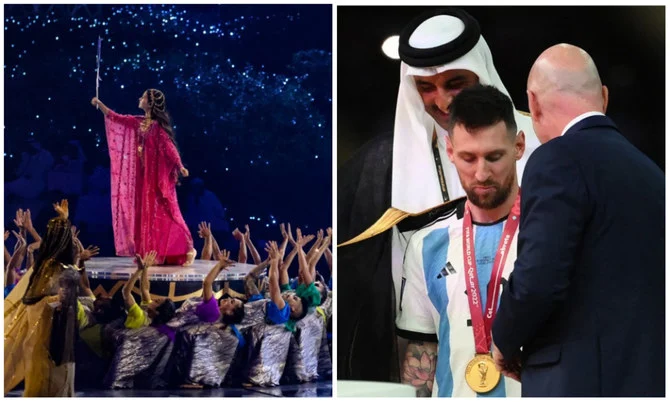Emirati and Qatari officials shared their countries’ insights and lessons learned from hosting the MENA region’s first post-COVID-19 megaevents, Expo 2020 and the 2022 FIFA World Cup, at the World Government Summit on Wednesday.
Addressing a session titled “Hosting Major Events: An Arab Success Story,” Expo 2020 Executive Director Najeeb Al-Ali said that 10 years ago, the directives of Sheikh Mohammed Bin Rashid Al-Maktoum, the UAE’s vice president and prime minister, and ruler of Dubai, were “very clear” about the event.
The directives were three-fold, Al-Ali said.
First, organizing Expo 2020 on UAE soil should be “an exceptional success.”
“The second fold was that the second generation were supposed to benefit to the maximum. Thirdly, Expo 2020 should become a legacy and not only a six-month event that ends once the event concludes,” he added.
In terms of success, the number of Expo 2020 visitors exceeded 24.1 million. However, Al-Ali said: “Definitely, that was not the largest number of visitors to visit an Expo event, worldwide … the resounding success was that we had 30 to 40 percent of those visitors coming from abroad.”
That was the exceptional success, according to Al-Ali, who said that the total number of visitors arriving from outside a host country had not exceeded 15 percent until Expo 2020.
He added that 192 countries and 14 global organizations took part in the UAE event.
“Those figures also made an exceptional success as it was the highest number of participants since London hosted the first Expo in 1851,” he said.
Regarding the event’s benefits for the second generation, the executive director said that the launch of the Expo School Program saw more than 1 million students from across the UAE and abroad visit the event for a once-in-a-lifetime educational experience.
Although the 30,000 volunteers who worked at Expo 2020 “might not have been the highest figure in the event’s history,” Al-Ali said, “those 30,000 volunteers came from 135 countries and that by itself was a resounding exception.”
In terms of Expo 2020 leaving a legacy, Al-Ali said that Sheikh Mohammad stressed the importance of the event’s location since day one. “He picked the venue where the event happened and that spot is an extension of Dubai … which is currently known by Dubai South, where the new airport, Dubai World Central, is located and also has several new projects coming up.”
The session moderator, Raya Rammal, senior presenter at Dubai Media Incorporated, addressed FIFA World Cup Qatar 2022 CEO Nasser Al-Khater, saying that the BBC described the world’s biggest sporting event as the ‘best World Cup in the 21st century.
“What made Qatar 2022 a booming success?” she asked.
“Many factors that led to the resounding success of Expo 2020 are similar to the factors that led to the World Cup’s success, such as community participation and volunteer programs. It was the biggest volunteering program in the event’s history … we received over 500,000 applicants but, unfortunately, we were only able to choose 20,000 volunteers,” Al-Khater said.
The 20,000 volunteers, 3,000 of whom came from outside Qatar, “enriched” the World Cup and made it an “exceptional success,” he added.
In terms of community participation, Al-Khater said: “Everybody in Qatar felt like the World Cup belonged to them … everybody, from the private sector to the government’s unlimited support, they all participated in that successful story.
“Since we submitted our file to host the WC in 2009, we had been saying ‘this is the Arab’s World Cup and this event represents all Arabs’.”
In response to Western media criticism of Qatar’s hosting, Al-Khater said: “I expect that every Arab felt like the tournament belonged to them and that it should succeed and be an ‘example’ for others that Arabs are capable of hosting successful World Cups or any other megaevent like Expo 2020.”
He added that the success of Expo 2020 and the Qatar World Cup will be “extremely difficult examples” for host countries to replicate in the future.
The quality and style of performances on the pitch also played an important role in the World Cup’s success, he added.
The size of Qatar, its swift transport mobility and short distances between the stadiums helped create a “carnival-like atmosphere,” which also played a part in the tournament’s success, said Al-Khater.

